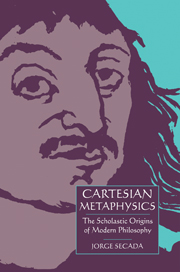Book contents
- Frontmatter
- Contents
- Preface
- Abbreviations
- Prologue
- Part I The unity of Cartesian metaphysics
- Part II Ideas and the road from essence to existence
- 4 Ideas and the world in the mind
- 5 My wax, my intellect and I
- 6 Essentialism and the existence of God
- Part III Cartesian substances
- Epilogue
- Notes
- References
- Index
5 - My wax, my intellect and I
Published online by Cambridge University Press: 22 September 2009
- Frontmatter
- Contents
- Preface
- Abbreviations
- Prologue
- Part I The unity of Cartesian metaphysics
- Part II Ideas and the road from essence to existence
- 4 Ideas and the world in the mind
- 5 My wax, my intellect and I
- 6 Essentialism and the existence of God
- Part III Cartesian substances
- Epilogue
- Notes
- References
- Index
Summary
Intellection, sensation and the world within the mind
Descartes's account of the acts or properties of the soul involves the following claims. First, there are things within the mind which, the self and its modes apart, are the only immediate objects of thought. Secondly, these mental things are innate in the sense that their production depends on the soul alone within which they exist, assuming only that God keeps it in existence. Thirdly, some of these inner objects, particularly in the case of the objects of sensations, are related to external things through occasional causation. Fourthly, self-consciousness apart, the intentional or representative relation of the mind to the external world is indirect, through intellectual judgement. Descartes endows the world within the soul with considerable ontological weight: the cause of an idea must have, to use his own terminology, at least as much reality formally as the idea has objectively.
The Meditations begin by leading the reader into this inner world. Towards the end of the First Meditation Descartes writes: ‘I shall think that … all external things are merely the delusions of dreams … devised to ensnare my judgement’ (AT, VII, 22). The first stop in the Cartesian journey towards truth and knowledge is the apprehension of our own existing essence, expressed in the third paragraph of the Second Meditation. But before the initial, purifying and preparatory, stage can be completed, Descartes must lead the reader away from sensation, so that she relies solely on her intellect.
- Type
- Chapter
- Information
- Cartesian MetaphysicsThe Scholastic Origins of Modern Philosophy, pp. 115 - 147Publisher: Cambridge University PressPrint publication year: 2000



